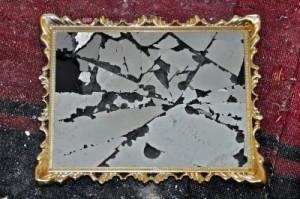The superstition of bad luck surrounding breaking a mirror has existed long before metal or glass mirrors were actually invented. Before these types of mirrors were produced, reflections of one?s self were seen in rivers, ponds, pools or bowls. If the reflection looked distorted, it was believed that disaster would strike. In fact, an ancient Greek divination, called catoptromancy, used shallow bowls filled with water to tell a person?s future based on the reflection revealed. One?s reflection represented an individual?s soul. Distorting a mirror, glass or water-filled bowl damaged the reflection, and thus, the soul.
The ancient Greeks, Hebrews and Egyptians produced mirrors made out of silver, gold, brass or bronze, which were unbreakable. These early mirrors were considered extremely valuable and possessed mystical attributes.
Almost universally, this superstition includes that the bad luck would last for seven years. The origin of this belief stems from an early interpretation in Roman times that each person?s body undergoes a physical regeneration every seven years. A broken mirror signified a break in the person?s health and well-being, going back to the theory of the mirror being the reflection of the soul.
In 15th century Venice, Italy, when glass mirrors backed by silver coating were first produced, they were prohibitively expensive. Servants of the wealthy, who most often would be in the position of cleaning or moving a mirror, could never afford its replacement, if broken. The punishment or threat of breaking a mirror became that of having to serve for seven years as an indentured servant to the mirror?s owner.
During the mid-1600s, when England and France were finally able to manufacture mirrors inexpensively, the superstition about bad luck and broken mirrors was already solidified in the culture.
It is noted that one way to avoid the bad luck associated with breaking a mirror is to take the broken pieces and bury them underground and under the moonlight.
To find out?about other superstitions, visit the Superstition Room.
![]()
![]()




